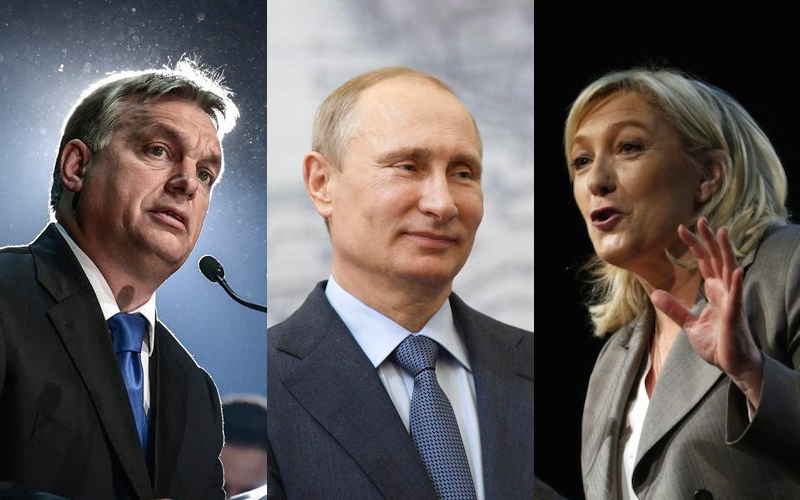
Euro Nationalists Love Putin’s Syria Gamble
When reading critics of Russia’s Syrian war, the impact in Europe is rarely considered. They have a limited view of Putin’s great game: the Middle East is crucial, but taking down the EU is a checkmate move.
Activists at PEGIDA’s (Patriotic Europeans Against the Islamization of the Occident) recent march in Dresden roared, “Merkel to Siberia, Putin to Berlin.” The anti-Islamist’s chant is telling. Russian strikes against Sunni jihadists in Syria are having a strong impact on political opinion in Europe. The increasing numbers already deeply alienated from the EU increasingly perceive Putin in positive terms. His man of action persona draws support from the swathe of Europeans concerned about Islam, mass immigration and the perceived remote elitism of Eurocrats. Whether Putin is the man that can save Assad, help destroy Islamic State and al Qaeda in Syria, while stemming the columns of refugee claimants remains uncertain.
What is certain is that his tone and actions are appealing to European nationalist populists. Amongst those who have spoken in his favor are Marine Le Pen and Victor Orban. Any risk of jihadist activity against the Russian population must be balanced against soft power gains globally, and in Europe specifically.
There is no doubt a considerable risk of Sunni jihadists looking for payback against Russia. But even if horrific terrorist attacks against civilians occur there is no certainty they will play against United Russia. They may in fact steel the population against a perceived enduring civilizational threat and increase support for Putin. The chances of any repeat of the Soviet experience in Afghanistan is unlikely; Putin does not spread global communism, but expands Russian influence and demonstrates loyalty to its allies.
The Islamic State (IS), with genocidal intent towards Christians, Shia, Jews and Yazidis rightly deserves to be universally reviled as the most barbaric political force in the World right now. Though Russian air power has attacked non-IS Islamists who offer the most direct threat to Assad’s regime, the perception is that the Russians have no reason to go slow against IS, al Qaeda or other Islamists in conflict with Assad due to regional affinities.
The near universal recognition of the regressive barbarity of IS ensures any party attacking them will receive kudos, while the US and NATO are perceived to be acting with trepidation. Western support of the rebels is deeply problematic as a key component. Jahbat al Nusr is essentially the al Qaeda franchise in Syria, the same terrorist hub that sparked the War on Terror in the first instance.
For many the EU is a failed project, and its most potent internal opponents, European nationalist parties, are not the peripheral actors they generally were a few decades ago. Leading scholar, Cas Mudde, defines the parties as being characteristically nativist, populist and authoritarian. In this sense it’s not difficult to see why there is a natural affinity between the current iteration of European nationalists and Putin.
In times of crisis there is often a demand for strong, charismatic leaders such as Putin, Le Pen and Orban. The nationalist leaders are apparent and vocal supporters of the sovereignty of historical European nations, and deeply averse to Islamism, mass immigration and the EU as it stands. The parties are now enduring democratic actors with growing popular support as many revolt against globalization and its perceived symptoms, including the EU.
Globalization is a process that is represented by the nationalists as being responsible for ethnic tension, social dislocation, economic disparity and insecurity, and the conscious dissolution of the historical identities of Europe by remote elites. These parties are the greatest threat to the EU and their growth is a huge boon for Putin in a geopolitical sense. At the moment his war in Syria serves to increase his popularity at home, amongst Shia, traditional Christians, and in Europe. If his nationalist populist associates gain power they will dissolve or reconstruct the EU, an outcome that can only be considered a win-win situation as far as he is concerned.
